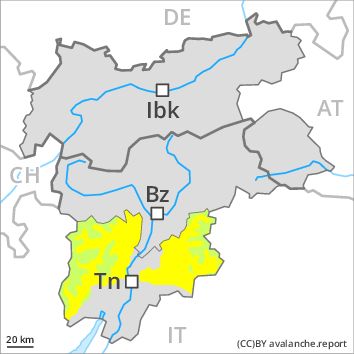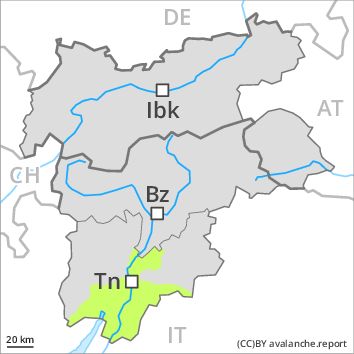Regions
Latemar, Southern Adamello, Primiero - Pale di S. Martino, Adamello - Presanella, Northern Brenta - Peller, Western Nonsberg Alps, Southern Brenta, Fassa Valley, Sole, Pejo and Rabbi, Southern Lagorai, Northern Lagorai, Maddalene, Paganella, Pine' - Mocheni Valley

Danger level
Avalanche Problem
Persistent weak layer above 2400m above the treeline, SE-S-SW-W

The snowpack will be well bonded in the early morning. Fresh wind slabs require caution, especially adjacent to ridgelines and in pass areas.
As a consequence of warming during the day and solar radiation individual gliding avalanches are possible, but they can reach medium size, especially at the base of rock walls and on steep grassy slopes below approximately 2400 m. At high altitudes and in high Alpine regions avalanche prone locations are more prevalent. Areas with glide cracks are to be avoided as far as possible. The fresh and older wind slabs must be evaluated with care and prudence in all aspects at elevated altitudes. They are mostly easy to recognise but can be released by large loads in particular. In the regions exposed to heavier precipitation caution is to be exercised in particular in gullies and bowls, and behind abrupt changes in the terrain.
Snowpack
dp 6: cold, loose snow and wind
dp 2: gliding snow
The wind has transported only a little snow. The fresh wind slabs are clearly recognisable to the trained eye. These are lying on soft layers in particular on shady slopes above the tree line. The older wind slabs have bonded quite well with the old snowpack. The snowpack will be well bonded until the middle of the day. Temporary increase in danger as a consequence of warming during the day and solar radiation.
Tendency
Moderate, level 2.
